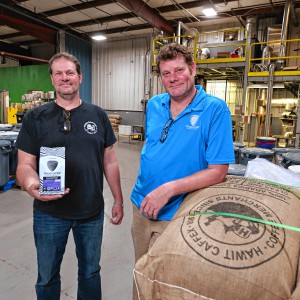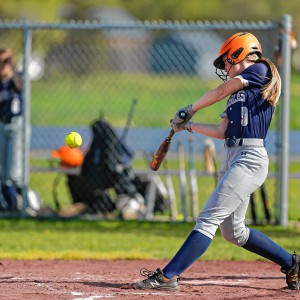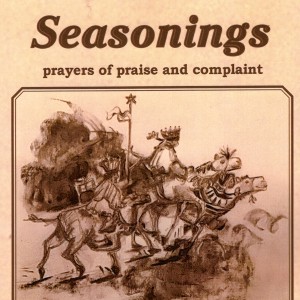Eggs, salami and Abe: Sharing a simple recipe and observations from my late father
| Published: 06-13-2023 3:56 PM |
Most Father’s Day food articles revolve around what to serve to one’s father on this day. For many of us, however, serving our father is impossible. It certainly is for me. My father, Abe Weisblat, has been dead for almost 25 years.
Nevertheless, I still celebrate him on the third Sunday in June. I often visit his grave. (His epitaph, “a gentle man,” is apt.) I remember his wise, funny spirit. And I cook something that reminds me of him.
I have learned a few things about my father since his death by going through old family papers. Here are a few of them.
First, at one time Abe considered becoming a farmer. This information would startle anyone who knew him later in life, when he was incapable of telling a horse from a cow.
He came to this country from Poland before his second birthday. At some point in college, he became interested in agricultural economics – in large part, I think, because he saw that field as a way of helping poor agrarian people in the United States and abroad move into parity with richer neighbors.
In one of my mother’s scrapbooks, I came across an article about him from the November 1943 newsletter of the Hillel Foundation of the University of Wisconsin (where my father went to graduate school). It says: “At present Abe is a graduate student in (agricultural economics). He hopes to own a 120 acre farm and teach at the University someday. Added to all this is an interest in sports, a lust for square dancing, and a hobby of collecting first editions.”
I have a feeling that the desire to farm (along with the love of square dancing) disappeared sometime within the following year as my father did a little work on a farm near the university.
My brown-thumbed father managed to grow exactly one radish and never tried to grow anything again. Still, it’s fascinating to know that he actually considered farming.
Article continues after...
Yesterday's Most Read Articles
 Fogbuster Coffee Works, formerly Pierce Brothers, celebrating 30 years in business
Fogbuster Coffee Works, formerly Pierce Brothers, celebrating 30 years in business
 Real Estate Transactions: May 3, 2024
Real Estate Transactions: May 3, 2024
 Greenfield homicide victim to be memorialized in Pittsfield
Greenfield homicide victim to be memorialized in Pittsfield
 Softball: Franklin Tech pulls away from Hopkins, 8-3 (PHOTOS)
Softball: Franklin Tech pulls away from Hopkins, 8-3 (PHOTOS)
 As I See It: Between Israel and Palestine: Which side should we be on, and why?
As I See It: Between Israel and Palestine: Which side should we be on, and why?
 Bridge of Flowers in Shelburne Falls to open on plant sale day, May 11
Bridge of Flowers in Shelburne Falls to open on plant sale day, May 11
A few years back, I learned another intriguing fact: Abe wrote letters home during a trip he took in the winter of 1946 to 1947 to occupied Japan. He was then working for the Department of Agriculture in Washington.
He and a few other social scientists were borrowed by the Army to conduct a survey of American forces in Japan to determine what new dress uniforms the troops would like to wear.
The topic was so strange that many of his friends thought he was a spy, that the uniform survey was a cover. He always maintained that the survey was genuine. I believed him. He wasn’t the spy type.
His letters, which my brother and I found a few years ago, heartbreakingly analyzed the plight of the residents of the cities he visited, which included Tokyo, Osaka and Nogoya.
He went on this mission at the coldest time of the year, and his heart went out to people trying to stay warm in a country that was still in shambles from bombing during the war. His letters severely criticized many of the U.S. soldiers he met, who frequently took advantage of the Japanese.
I’m hoping to write an article about these letters soon; they are insightful and touching.
My last revelation about my father wasn’t a revelation at all, but a reminder that he was deeply thoughtful and very smart. Here is an excerpt from a letter he wrote to my mother in 1954 after visiting the cathedral in Toledo, Spain.
“The Cathedral dominates all – for there is none comparable to it in Europe. The wealth of South America and Spain is in that church.
“It’s hard to describe – iron grill works that have to be seen to be believed, treasures that defy description, a gold replica of the church, one of the loveliest Madonnas encrusted with jewels, the jewel of the El Greco collection.
“At least 24 of his greatest works – illuminated manuscripts – one magnificent altar after another. Its structure is elaborate Gothic and simply goes on and on.
“But I must say that it left me with a completely different feeling from Chartres. At Chartres I felt I understood why people came to worship God.
“Here all I felt was the power of the Catholic church – its ability to command an edifice that combines all the wealth of many centuries. It’s proud of its church and rightly so – but to worship in it would leave me in awe and fear – it’s so grand – so bewildering – so mystical.
“Chartres was warm – it felt like you were where God would be kind and listen and be with you. At Toledo he would simply look down.”
I love the way in which he moved from a description of architecture and decoration in a church to what the church’s appearance says about hierarchy and theology.
I could go on and on, but I know I have to stick a recipe in here. So I offer one of Abe’s standbys.
He was emphatically not a cook. When he was on his own his customary evening meal was a martini with stuffed olives and a jar of pickled herring accompanied by matzo or crackers.
He found this a perfectly balanced meal, pointing out that it provided protein (the herring), fruit (the olives), and a vegetable (the pimientos in the olives).
He was proud to note that if he ate the crackers straight out of the box and the herring straight out of the jar, he needed to wash only two things at the end of his repast: a glass and a fork.
One of his other favorite meals was salami and eggs. This recipe involves a small amount of chopping and a small amount of cooking.
Nevertheless, it calls for only two ingredients. And the chopping and cooking take five minutes tops. My father could eat salami and eggs for breakfast, lunch, or supper… and frequently did.
Before I proceed to the extremely brief recipe, I leave you with one more quotation from Abe. This was on the back of a postcard he sent to my brother and me from Greece when we were little. My mother kept it, and I rediscovered it after her death.
“There is a lovely story that God’s hand touches those who have seen the TajMahal and the Parthenon. Now I know why – and someday he will touch both of you.”
Happy Father’s Day from my family to yours.
Ingredients:
2 slices (between 1/8 and 1/4 inch thick) kosher salami
2 eggs
(You may add a little pepper if you like – but you don’t really need to. And there’s enough sodium in the salami to preserve your guts for weeks so don’t worry about salt!)
Instructions:
Cut the salami slices into 5 or 6 pieces, and cut some of those pieces in half.
Pop the salami pieces into a small, nonstick frying pan over medium heat. (In days of yore my father didn’t use a nonstick pan, but kosher salami is less fatty than it used to be, so the nonstick pan helps.)
Toss them around until they brown.
Whisk the eggs together, pour them over the salami pieces, and quickly toss and cook the mixture until the eggs are set to your liking.
Depending on hunger and time of day (and what if anything else is being served), this serves 1 to 2.
Tinky Weisblat is an award-winning author and singer. Her most recent book is “Pot Luck: Random Acts of Cooking.” Visit her website, TinkyCooks.com.
]]>

 Speaking of Nature: Indulging in eye candy: Finally, after such a long wait, it’s beginning to look like spring is here
Speaking of Nature: Indulging in eye candy: Finally, after such a long wait, it’s beginning to look like spring is here Celebrating ‘Seasonings’: New book by veteran preacher and poet, Allen ‘Mick’ Comstock
Celebrating ‘Seasonings’: New book by veteran preacher and poet, Allen ‘Mick’ Comstock Faith Matters: How to still the muddy waters of overthinking: Clarity, peace and God can be found in the quiet spaces
Faith Matters: How to still the muddy waters of overthinking: Clarity, peace and God can be found in the quiet spaces A time for every purpose under heaven: Free sing-a-long Pete Seeger Fest returns to Ashfield, April 6
A time for every purpose under heaven: Free sing-a-long Pete Seeger Fest returns to Ashfield, April 6
